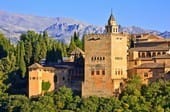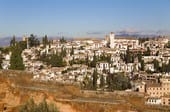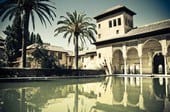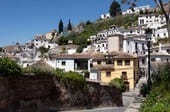The granada TESOL course is in the perfect place to enjoy the present and discover the past. History is all around you here. granada's rich cultural history and architecture is fervently kept alive. The sumptuous cuisine, the sound of Flamenco music played late into the night, and the coming together of Christianity and Islam is truly amazing—Grenada is a one-of-a-kind place.
granada has one of the last fortresses of the Moorish empire to be built in Western Europe. The world renowned Alhambra and the Generalifé are examples of the magnificence of this intriguing civilization.
Here in 1492, Christopher Columbus gained the support he required and a charter from Queen Isabella to explore a new trade route to India, which eventually resulted in discovering the Americas.
granada Cathedral is the tomb of the Catholic monarchs Ferdinand and Isabella. Visit The Medina, the Moroccan market of shops and tetarías (tea shops), in the shadow of granada Cathedral, located in an intricate maze of narrow alleyways.
You can also visit the fascinating Sacromonté 'gipsy barrio', home of the "Flamenco puro", meet a totally unique people, with their ardour for dance and music, and see their intriguing cave homes.
granada has a remarkable geography, being located in a magical valley between the relatively warm Mediterranean Sea and the mountains: only a 45-minute car ride to beaches, 75 minutes to Malaga, and 30 minutes to a ski resorts in the Sierra Nevada, 3,400 metres (11,050 feet) high.
Encounter the essence of Andalucían Spain during the Pasos of Semana Santa (Easter week), first enacted in medieval times and portraying the Passion of Christ. Costaleros carry massive, heavy statues of the Virgin Mary, Christ, and saints on their shoulders and process from the many churches in Granada, winding through the streets and into the Cathedral, finally returning to their own churches. Some of these journeys take 14 hours! The ancient brotherhood of the Cofradía, dedicated to the preservation of this and other celebrations throughout the year, takes part in the processions and decorates the statues, particularly those of the Virgin Mary.
Don't miss the Andalucían food, while visiting here. This cuisine is characterized by simple, yet delicious flavours. Favourites include Pescado Frito: fish delicately coated with flour and sautéed in olive oil; Gazpacho: the famous cold tomato soup, a vegetable cream made with cucumber, garlic, paprika, olive-oil, vinegar and served with bread; Patatas Pobre: a hot pot of vegetables and potatoes; Huevos a la Flamenca: a fried egg in tomato sauce with Chorizo, a spicy spanish sausage; and of course the delectable Paella!
Enjoy the social experience of "tapas", a famous daily Andalucian tradition, at one of the very many bars in the city; a favourite way to snack and get to know some people.
Register now & get certified to teach english abroad!The School
During your TESOL course in Granada you will experience high quality training in an unparalleled environment. Our TESOL training centre is in the Albayzin, the celebrated Arabic district of Granada near the Alhambra, surrounded by cobbled and narrow, traffic-free streets, plazas, fountains, and white-washed houses.
You will surely appreciate this historic neighbourhood. The Albayzin has the famous "Carmens and Casas of Granada" - traditional Arabic homes with beautiful, shaded patios, serene secret gardens and stirring ancient architecture.
The TESOL training centre is housed in a beautiful Carmen property with several classrooms, plentiful training resources, a coffee shop with a wonderful garden and a computer centre with WiFi Internet.
The school is a five to ten minute walk down the hill into the modern city's centre, and ten to fifteen minutes back up to the school. Buses regularly make the round trip, if you're feeling daunted by the hill. Many bars, café's, shops and restaurants are in the city centre for you to enjoy.
Accommodation
Your accommodation during the TESOL course in Granada is in a renovated 16th century medieval Hospedería in the historic Moorish village and World Heritage site of the Albayzin. Sharing life together with other trainees inevitably becomes part of the unique cultural experience of taking this course, as you bond with, help and encourage each other.
Trainees stay in private bedrooms with a washbasin or a private bathroom, sharing a common room with television, WiFi internet, an eating area, laundry facilities and a large kitchen. A resident manager is there to take care of you during your stay.
Additionally, the Hospederia has a roof terrace with a view of the world-famous Alhambra and an inside patio. It's a short walk from here to the training centre and within walking distance of historical sites and Granada's nightlife and restaurants.
Course dates
 Coming soon...
Coming soon...Please check out our other course locations if you wish to attend a course before this one becomes available...
Course fees
The total price is divided into: deposit and balance.
The deposit may be paid via a) credit card b) Paypal c) wire transfer d) Western Union.
The balance of the course fee must be paid by cash, PayPal or bank transfer directly to the training center on the first day of the course.
US$ 600
Euros 980
Accomodation Fees
The accommodation fees are not part of the course price and you are free to choose whichever accommodation option you prefer.
If you choose to use our accommodation, it should be paid for either by cash, PayPal or bank transfer directly to the school at the start of the course.
Euros 330







